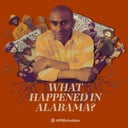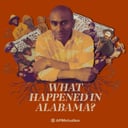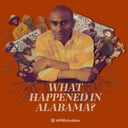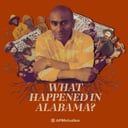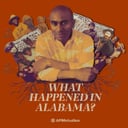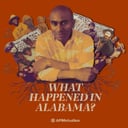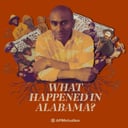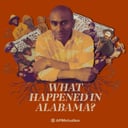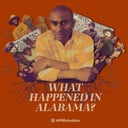
Introducing: What Happened in Alabama?
What Happened in Alabama? is a series born out of personal experiences of intergenerational trauma, and the impacts of Jim Crow that exist beyond what we understand about segregation. Through intimate stories of his family, coupled with conversations with experts on the Black American experience, award-winning journalist Lee Hawkins unpacks his family history and upbringing, his father’s painful nightmares and past, and goes deep into discussions to understand those who may have had similar generational - and present day - experiences.TranscriptMy name is Lee Hawkins. I’ve been a journalist for 25 years. I research, listen and ask ALOT of questions.My story begins in 1980s Minnesota. In the Twin Cities suburb of Maplewood. We were a Black family living in a predominantly white neighborhood. Naima: Oh, Maplewood. It was, it was really interesting. It certainly was. My childhood was marked by so many things.Watching our backs on the walk home from school.Getting our hair cut in the Black neighborhood. And church on Sundays. [MUSIC IN: Lee sr singing “Whose on the lord side”] Leroy Hawkins: Alright Who's on the lord's side? That’s my dad, Leroy Hawkins Senior, singing at our church. [MUSIC OUT Lee sr singing “Whose on the lord side”] He taught me how to sing. We played music together. And he really believed in me Lee Sr: Cause when you grew up, everything, you touched was great.From the time I was a little kid, it was always me and him. Lee Sr and Lee Jr . . . Leeroy and Lee Lee. But while my dad was happy at church, nightmares interrupted his sleep sometimes. He’d wake up screaming, startling the whole house. It scared me so much as a kid.One morning, I got the courage to ask him what he was dreaming about. He just looked down at the floor and said, “Alabama, son. Alabama.” Lee Sr.: When I had left Alabama, something came out of me, man. A big ass relief. And I didn't even know where I was going. But it was a big ass, just, man like a breath of fresh air, man. And ...

Introducing: What Happened in Alabama?
What Happened in Alabama? is a series born out of personal experiences of intergenerational trauma, and the impacts of Jim Crow that exist beyond what we understand about segregation. Through intimate stories of his family, coupled with conversations with experts on the Black American experience, award-winning journalist Lee Hawkins unpacks his family history and upbringing, his father’s painful nightmares and past, and goes deep into discussions to understand those who may have had similar generational - and present day - experiences.TranscriptMy name is Lee Hawkins. I’ve been a journalist for 25 years. I research, listen and ask ALOT of questions.My story begins in 1980s Minnesota. In the Twin Cities suburb of Maplewood. We were a Black family living in a predominantly white neighborhood. Naima: Oh, Maplewood. It was, it was really interesting. It certainly was. My childhood was marked by so many things.Watching our backs on the walk home from school.Getting our hair cut in the Black neighborhood. And church on Sundays. [MUSIC IN: Lee sr singing “Whose on the lord side”] Leroy Hawkins: Alright Who's on the lord's side? That’s my dad, Leroy Hawkins Senior, singing at our church. [MUSIC OUT Lee sr singing “Whose on the lord side”] He taught me how to sing. We played music together. And he really believed in me Lee Sr: Cause when you grew up, everything, you touched was great.From the time I was a little kid, it was always me and him. Lee Sr and Lee Jr . . . Leeroy and Lee Lee. But while my dad was happy at church, nightmares interrupted his sleep sometimes. He’d wake up screaming, startling the whole house. It scared me so much as a kid.One morning, I got the courage to ask him what he was dreaming about. He just looked down at the floor and said, “Alabama, son. Alabama.” Lee Sr.: When I had left Alabama, something came out of me, man. A big ass relief. And I didn't even know where I was going. But it was a big ass, just, man like a breath of fresh air, man. And ...

